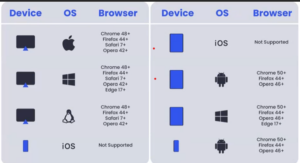We are extremely excited to announce the general availability of Azure Notification Hubs Browser Push Notifications, also known as Web Push Notifications. We know this has been a long asked for feature and we’re happy to say that you can now send notification messages via web browsers with ANH. This feature can be used through the Azure Portal, our REST APIs or Server-side SDKs.
Azure Notification Hubs now supports Browser Push for all major browsers including Microsoft Edge, Google Chrome and Mozilla Firefox. Apple Safari is not included as you can use existing APNS support as described in Configuring Safari Push Notifications , with certificate-based authentication. Browser Push capability is currently supported across platforms with the following: 
You can find detailed step by step instruction and learn more here: https://learn.microsoft.com/en-us/azure/notification-hubs/browser-push
Azure Notification Hubs now allows you to create direct sends, audience sends, or debug sends with Web Push. You can easily set your credentials and send a debug send in the Azure Portal.
We hope that you enjoy the additional capabilities of Browser Push Notifications with Azure Notification Hubs. Thank you for choosing Azure Notification Hubs!


It looks like somebody has done all the hard work and it just needs to be merged in. 😊
Thank you Markus Engel.
Hi would you be able to explain why you don’t have a single example using MAUI? Is there any planning to have one?
Thanks
this comment has been deleted.
This comment has been deleted.
Absolutely brilliant news to hear this has gone public - I can't wait to add it to my PWA.
It would be great if the linked instructions were updated with more detailed examples, as I am not able to get it working in my scenario.
In the "Create browser installations (SDK)" section, what namespace do BrowserPushSubscription and BrowserInstallation come from?
The CreateOrUpdateInstallationAsync method expects an Installation type instance, not BrowserInstallation.
Installation type has a Platform property, which has a value from the NotificationPlatform Enum - but Browser is not an option.
Please, please, please would you add some well fleshed-out examples.
Thank you,
Paul.
I found this related issue in the GitHub repo.
So I now know what I am after is browser push functionality in the client.